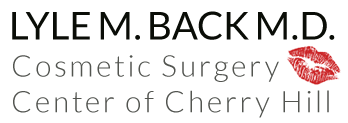Novel Uses For Botox
Botox® is used regularly to enhance the arched shape of the eyebrows and for lifting them, opening up the eyes and lessening the effect of any sagging skin of the upper eyelids. Botox® is also useful for improving eyebrow asymmetry – where one eyebrow is higher or lower than the other or has a configuration that is more flat or overly arched compared to the other side. Many patients will find that long-term, the Botox® created effect on the symmetry of the eyebrows begins to maintain itself even without further Botox® treatments.
Botox® can be used to treat prominent lines and folds in the neck, creating a younger, smoother look to the neck without the need for surgery or laser therapy.
Botox® can be used to smooth out an overly wrinkled or puckered looking chin by relaxing the tiny muscles that are responsible for this undesirable look.
Botox® can soften fine lines around the lips (“smoker’s lines”) and mildly increase the size and fullness of the lips without using a filler, fat or any surgical procedure.
Botox® is often quite helpful in treating patients with facial asymmetry as a result of trauma, surgical procedures, birth deformity or Bell’s Palsy. Overactive muscles which are exaggerating and perpetuating any asymmetries can be made to relax.
Botox® for Masseter Hypertrophy – a condition which makes the face look full and wide (at the jaw level) – is often performed. Botox® relaxes the over-thickened and overdeveloped muscle, making the face look thinner, more oval, less square and more feminine. No surgery required.
Botox® treatments into the masseter muscle for symptoms of TMJ syndrome or teeth grinding are also often very effective. The injections result in less pressure on the temporomandibular joints and the teeth or jaws, providing long-term relief.
A wide variety of different types of chronic, recurrent headaches, including migraines will significantly reduce in number and/or severity with Botox® treatments. Sometimes these headaches will even completely disappear for months at a time (as an indirect effect) when the Botox® has simply been used directly to treat facial wrinkles. This is all without injecting into the scalp or head or doing any type of “mapping”. Many patients with a headache affecting them at the time of their Botox® treatment will find the headache abating even before they leave the office (i.e. within minutes of treatment!). Patients with headache “trigger points” in the scalp or temporal areas will often get tremendous relief with small Botox® injections into these spots. The FDA approved Botox® medically for such treatments in 2010.
Botox® is quite good for the treatment of axillary hyperhidrosis (excessive armpit sweating) in both men and women. This is no joke – these patients suffer terribly from an extreme form of unrelenting armpit sweating, independent of temperature, stress or anxiety. Axillary hyperhidrosis causes significant and embarrassing staining of the clothes or jackets; clothes are often ruined after being worn only once. There is often associated odor as well. Botox® can reduce the sweating levels to nearly zero for months. There also seems to be an overall long-term beneficial reduction effect even without further treatments. In the same manner, Botox® is also very useful for the excessive sweating problems of palmar (hands) and plantar (feet) hyperhidrosis. The FDA approved Botox® medically for such treatments in 2004.
Even more unique and medically creative uses abound. Patients with a lifelong history of refractory, problematic severe stuttering have been cured by special Botox® treatments for the vocal cords. Patients who in the past would have required surgery for certain types of severe swallowing disorders now have the possible available option that Botox® treatments (by endoscopy guided injections into the esophagus) – no surgery – might be all that is ever needed. Many patients with severe cerebral palsy, MS and other long-term, chronic, disabling conditions often have associated tightness of the limbs (extremity contractures) necessitating regular and painful physical therapy. Botox® treatments have been utilized to make the affected limb muscles more limber and less tight, making the therapy more tolerable, more effective, and easier to perform. Botox® has also been successfully used to treat painful neck and back muscle spasms, often helping more than traditional medications, physical therapy or “blocks”. Botox® treatments to the urinary bladder for urinary incontinence or spastic bladder problems have been demonstrated to be very effective in helping women with these all too common problems.
Dr. Lyle Back is originally from New York City, receiving his medical and surgical training at Rutgers Medical School, Cooper Hospital – University Medical Center, and Ohio State. He is Board Certified in General Surgery (ABS) and Plastic Surgery (ABPS). He is a Fellow of the American College of Surgeons (ACS), the American Academy of Cosmetic Surgery (AACS), and a longstanding member of the premier American Society of Plastic Surgeons (ASPS). He served as a Professor of Plastic Surgery at Temple University and St. Christopher’s Hospital for Children and performed reconstructive surgery with “Operation Smile” in Vietnam. He specializes in the full range of the most modern and state of the art facial cosmetic surgery procedures and non-surgical cosmetic enhancement techniques available today.
